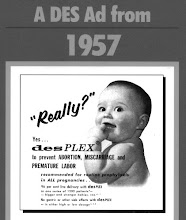 In March this year the Royal Australian and New Zealand College of Obstetricians and Gynaecologists (RANZCOG) reviewed its College Statement (C-Gen 8) Diethylstilboestrol (DES) Exposure in Utero. This Statement now includes information that annual mammography is recommended for women aged 40 and over in view of the recent reports of increased breast cancer risks in these age groups.
In March this year the Royal Australian and New Zealand College of Obstetricians and Gynaecologists (RANZCOG) reviewed its College Statement (C-Gen 8) Diethylstilboestrol (DES) Exposure in Utero. This Statement now includes information that annual mammography is recommended for women aged 40 and over in view of the recent reports of increased breast cancer risks in these age groups.The June 2009 BreastScreen Australia Evaluation Final Report (Screening Monograph N0:1/2009, Policy Issue No:6) states: Women who were exposed to DES in utero may have a slightly higher risk of breast cancer. However, the level of risk is similar to exposure to a range of other risks that would not generally require more intensive screening or management protocols.
The Department of Health and Ageing's Cancer Screening Section has been notified by DES Action NSW of this discrepancy regarding screening between the Report and the College Statement. However, no action is intended by the Department on this matter.
DES Action NSW stands by the following information provided by its partner organisation DES Action USA:
DES daughters over age 40 should have a mammogram every year, along with a clinical breast examination (presumably at the same time as her annual DES examination).
Recommendations for DES mothers call for annual breast screenings, including clinical breast examinations and mammograms.
Disturbingly, the 2009 BreastScreen Australia Evaluation Report makes recommendation that women aged 40-44 and women aged 75+ be made ineligible for BreastScreen Services. If implemented, the worst impact would be for the thousands of Australian women who are still unaware of the fact of having been exposed to DES.
DES Action NSW has suggestions to help DES mothers and daughters access annual mammograms at BreastScreen services. To find this information, go to the previous blog item 17/1/09.
